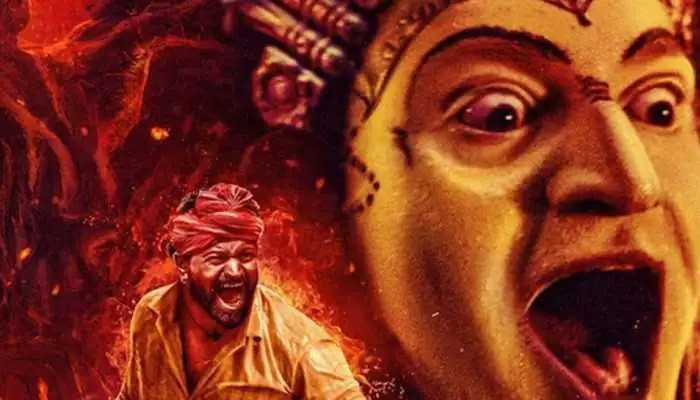Kantara – Decolonising Nature
- In Movie Reviews
- 11:29 PM, Nov 06, 2022
- Venkataraman Ganesan
In his bewitchingly compelling book, Being Pagan – A Guide to Re-enchant Your Life[1], druid, theorist and writer Rhys Wildermuth conveys to his readers the alluring relationship that our ancestors developed and nurtured with nature in general and land in particular. According to Wildermuth, “To be pagan is to be connected to the land in a way that stands outside of—and often in opposition to—the concerns of the urban and of Empire… It is a history of relationship to land, of connection to it, of life lived in relative harmony with the nature of which humans are but one small part. It is not just a history, however, but a still-living reality for much of the world, and one we can still connect to and become part of.”
Film maker Rishab Shetty in his box office mesmerizer, ‘Kantara’, lends unabashed, unfettered and unconstrained expression to Wildermuth’s ingenious contention. Grappling with questions empirical such as ‘who owns the land’, and existential such as ‘does divine intervention really exist?’, Rishab Shetty bridges the past and the present while lending a directional aspect to the future. ‘Kantara’ bristles with a local flavour yet brims with global conundrums. Whether it be the ‘Bhoota Kola[2]’ festival which pays rambunctious obeisance to the demigod, Panjurli, or the equally raucous ‘Kambala[3]’ ritual, which involves marauding buffaloes making swift work of a stretch of water, with their owners yoked to them, Kantara is an epistemic construct and an ontological marvel. However, Rishab Shetty retains the tricky but necessary quintessence of the movie by ensuring that the message is neither floundered nor suffers from a flimsy touch.
‘Kantara’ is a visual delight that is a judicious blend of myth, mystique and mystery. The movie begins with events unraveling in the year 1847. A benevolent king lacking for nothing, but inner solitude and solace undertakes an arduous journey seeking all elusive peace. His endeavour bears fruition when his eyes land on a small stone sculpture erected in the middle of a small forest. However, the inhabitants of the forest, upon being directed by their deity, agree for the king to possess the statue, subject to the condition that he makes over his vast swathe of land to the villagers. All the king’s descendants keep to this commitment until a greedy descendent in the year 1970 decides to part ways with tradition. Threatening legal action, the greedy capitalist makes his intention of usurping the land, crystal clear.
In the ensuing Bhoota Kola festival, the deity Panjurli warns the landlord of the dire consequences of such a measure upon being rebuffed and mocked, the lead performer who is possessed by Panjurli bolts through the forest only to disappear in a ring of embers. As professed by Panjurli, the landlord dies on the stairs of the court, spouting blood. The story now moves on to the year 1990: Shiva (Rishab Shetty), the son of the departed Bhoota Kola performer is indifferent to divinity and destiny. Whiling away time hunting wild boars and decimating his competitors in the annual Kambala ritual, Shiva irks his mother no end in the company of his mischievous friends.
A new forest officer, Murali (Kishore) threatens to take things to a boiling point by terming the villagers, as ‘encroachers’ and cocking a snook at local customs and traditions. However, he is thwarted at every step by a benevolent landlord, Devendra Suttooru (Achyuth Kumar).
The trifecta of an obstinate cop, an obsequious landlord and a group of observant people move the movie at breakneck speed as things take many murky turns that challenge even the trickiest of hairpin bends. Leela, (Sapthami Gowda), a new trainee in Murali’s police force and Shiva’s love interest is torn by conflicting interests that oscillate between adhering to her duty in keeping the villagers away from their land and owing allegiance to long-standing customs and traditions. Things come to a head when the benevolent landlord turns out to be a wolf in sheep’s clothing…
Visceral emotions, vile motives and vituperative rifts ensure that the viewer is caught by the scruff of his neck and buffeted in a sustained manner like a ragged doll by gale-force winds and mountainous waves.
‘Kantara’ is a grand spectacle. A reverberating clash of colours, the movie is a medley of rapturous auditory and visual delights. Burning torches that transform nights into days, powerful local beliefs and practices that find an outlet in the form of seraphic performance arts and the constant tug and push between commercialism and custom all make for some astoundingly riveting experience.
‘Kantara’ is Rishab Shetty. With a superb exhibition of flawless acting, Shetty regales the audience with his infuriating and cathartic sentiments. Shiva is fury incarnate, emblematic of compassion, indifferent to devotion, fiercely loyal to customs and inseparable from his friends. Shiva is a cauldron of conflicting emotions as he delights and disappoints in equal measure. Egregious, yet ennobling, Shiva is a kaleidoscope of imperfection that signifies the whole gamut of what it means to be human.
Leela as the reluctant policewoman and devoted lover is to a great extent, and unfortunately so, overshadowed by the intimidating character of Shiva. Murali, the forest officer is a force to reckon with and his portrayal by Kishore is more than just convincing. However, at the heart of the movie is the slapstick humour that intersperses the conversation between Shiva his friends. Sending audience into peals of laughter, Shiva and company are a riot. However, a semblance of sexism that involves comparing a woman’s protruding set of teeth to that of a buffalo’s mouth makes for some uncomfortable viewing. Such crass references could have been expunged from what otherwise is a dazzling movie that has rightfully wedged itself into the pantheon of the enduring along with the likes of KGF, Pushpa, and Bahubali.
The last 30 minutes of the movie is an edge-of-the-seat affair that sends viewers into a dizzying whorl of inexplicable experience. An experience that is phenomenally immersive. Rishab Shetty pulls back no punches and hammers beyond his weight as he leaves his adoring audience totally gobsmacked, poleaxed and stupefied.
Arvind Kashyap’s cinematography is a breathtaking piece of absolute brilliance. The charge of a boar in the dead of the night, the rampaging buffaloes hurtling across a bank of the river, and the spectacular Bhoota Kola dances linger long after the credits have faded away. The music by Ajaneesh Lokanath is spellbinding and we sincerely hope that the controversy of plagiarism[4] surrounding “Varaha Roopam” the most influential and topical track in the movie, comes to an amicable resolution, bereft of all acrimony.
Rhys Wildermuth also has an absorbing collection of nature-related pieces titled “Your Face is Your Forest”. Rishab Shetty’s ‘Kantara’ is a multitude of forests. Each forest is attuned to an inimitable face embedding attributes of its own. Each forest narrates the story of the face to which it is inextricably linked and incorrigibly attached. Each forest boasts within the confines of its own thickets, swamps, reeds, bushes and creepers, a rich legacy that is beyond the comprehension of even a compatriot. Each forest clamours for its rightful niche and continuing existence.
‘Kantara’ – decolonizing nature.
References
- Being Pagan: A Guide to Re-Enchant Your Life - Kindle edition by Wildermuth, Rhyd. Religion & Spirituality Kindle eBooks @ Amazon.com.
- Bhoota Kola - Fiery Folk Art Form of Konkan Culture (caleidoscope.in)
- Kambala Festival | Buffalo Race | Karnataka Festival | Karnataka Tourism
- 'Kantara' song 'plagiarism' row: Court orders to stop playing Varaha Roopam in theatres- The New Indian Express
Image source: Zee News
Disclaimer: The opinions expressed within this article are the personal opinions of the author. MyIndMakers is not responsible for the accuracy, completeness, suitability, or validity of any information on this article. All information is provided on an as-is basis. The information, facts or opinions appearing in the article do not reflect the views of MyindMakers and it does not assume any responsibility or liability for the same.







Comments